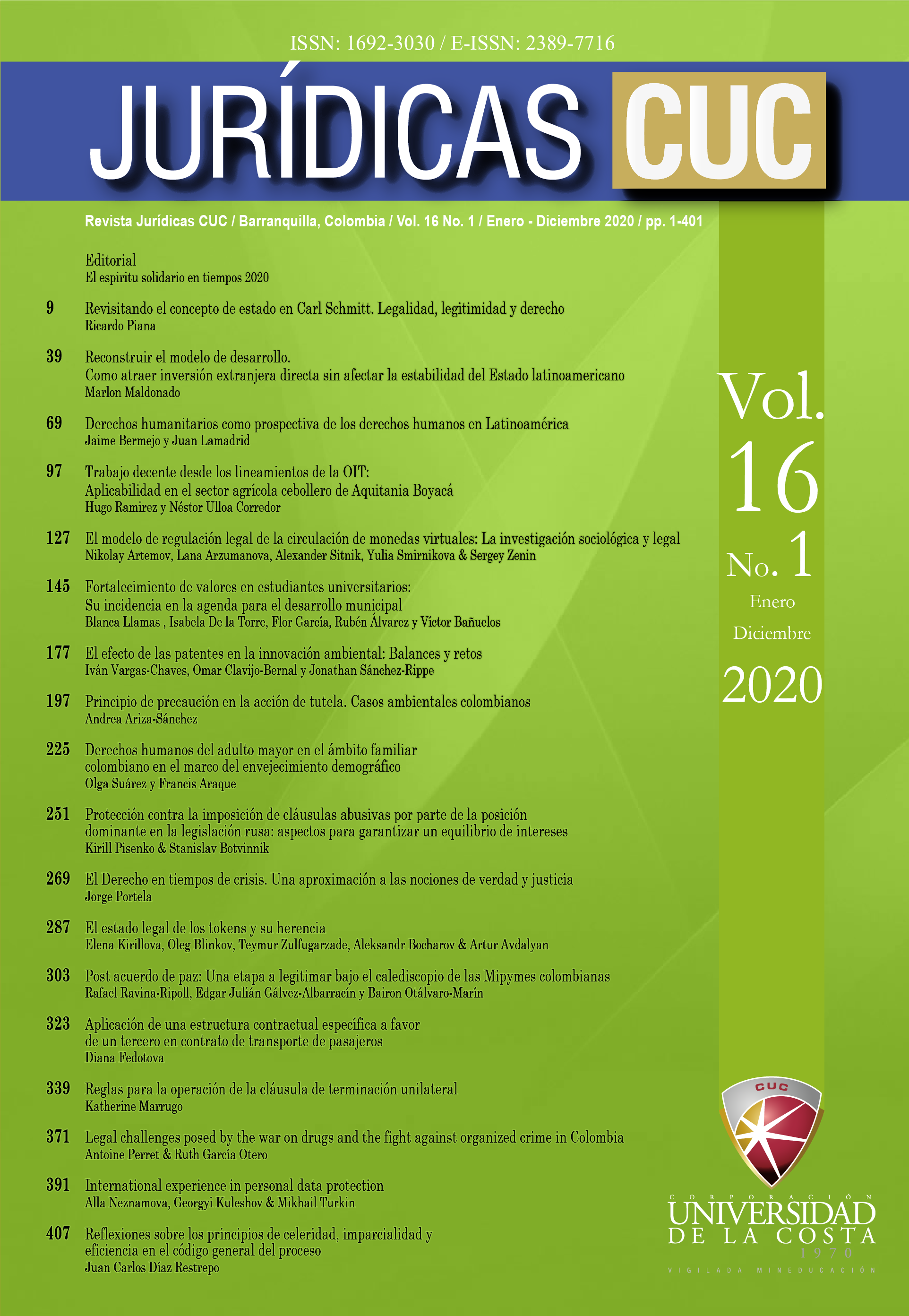El estado legal de los tokens y su herencia
DOI:
https://doi.org/10.17981/juridcuc.16.1.2020.12Palabras clave:
estado legal, heredero, tecnología de blockchain, tecnología digital, token, herencia, criptomonedaResumen
Este artículo analiza el estado legal de los tokens, sus características específicas y distintivas, así como la posibilidad de herencia de este activo digital. El objetivo del estudio es analizar la naturaleza legal y la clasificación de los tokens, así como las especialidades de herencia. En esta investigación, se han utilizado los métodos de recopilación y estudio de singularidades, generalización, abstracción científica, cognición de leyes objetivas, objetividad, especificidad y pluralismo. En el estudio se ha concluido que el token es una entrada en el registro de bloques de transacciones (blockchain), otro sistema de información distribuida que verifica que el propietario del token tiene derechos sobre objetos de derechos civiles y (o) es una criptomoneda. Se ha demostrado que los tokens, por su naturaleza legal, son unidad del precio digital en las acciones de individuos en proyectos empresariales, así como en el capital autorizado de la empresa: un análogo del precio digital de valores no certificados; análogo del precio digital de otros objetos de derechos civiles. Se ha propuesto una clasificación de tokens y se ha argumentado la necesidad de crear un repositorio electrónico contenido códigos del acceso para activos digitales, después de la muerte del testador, estos códigos pueden presentarse a los herederos por testamento o ley, si el testador no ha hecho las disposiciones testamentarias correspondientes durante su vida. Estas conclusiones y sugerencias ayudarán a resolver en la práctica los problemas de calificación legal del token y resolver problemas de herencia en esta área.
Descargas
Citas
Bryans, D. (2014). Bitcoin and money laundering: mining for an effective solution. Indiana Law Journal, 89(1), 441–472. Available from https://www.repository.law.indiana.edu/ilj/vol89/iss1/13/
Ciaian, P. and Rajcaniova, M. (2018). Virtual relationships: short- and long-term evidence from BitCoin and altcoin markets. Journal of International Financial Markets, Institutions and Money, 52(1), 173–195. https://doi.org/10.1016/j.intfin.2017.11.001
Corbet, S., Lucey, B., Urquhart, A. and Yarovaya, L. (2019). Cryptocurrencies as a financial asset: A systematic analysis. International Review of Financial Analysis, 62(C), 182–199. https://doi.org/10.1016/j.irfa.2018.09.003
Davidson, L. and Block, W. (2015). Bitcoin, the regression theorem, and the emergence of a new medium of exchange. The Quarterly Journal of Austrian Economics, 18(3), 311–338. Available from https://mises.org/library/bitcoin-regression-theorem-and-emergence-new-medium-exchange
de Graaf, T. J. (2019). From old to new: From internet to smart contracts and from people to smart contracts. Computer Law & Security Review, 35(5), 105322. Available from http://hdl.handle.net/1887/80378
Grinberg, R. (2011). Bitcoin: an innovative alternative digital currency. Hastings Science & Technology Law Journal, 4(1), 159–208. Available from https://repository.uchastings.edu/hastings_science_technology_law_journal/vol4/iss1/3/
Gürkaynak, G., Yılmaz, İ., Yeşilaltay, B. and Bengi, B. (2018). Intellectual property law and practice in the blockchain realm. Computer Law & Security Review, 34(4), 847–862. https://doi.org/10.1016/j.clsr.2018.05.027
Janssen, M., Weerakkody, V., Ismagilova, E., Sivarajah, U. & Irani, Z. (2020). A framework for analyzing blockchain technology adoption: Integrating institutional, market and technical factors. International Journal of Information Management, 50(1), 302–309. https://doi.org/10.1016/j.ijinfomgt.2019.08.012
Kirillova, E. A., Pavlyuk, A. V., Zulfugarzade, T. & Mikhailova, I. A. (2018). Bitcoin, lifecoin, namecoin: the legal nature of virtual currency. Journal of Advanced Research in Law and Economics, 9(1), 119–126. https://doi.org/10.14505//jarle.v9.1(31).16
Kotlyarov, S. B. (2018). Correlation of the notions of "law" and "legal procedure". Law and Education, (2), 44–49. Available from https://elibrary.ru/item.asp?id=32382027
Lorne, F., Daram, S., Frantz, R., Kumar, N., Mohammed, A. and Muley, A. (2018). Blockchain Economics and Marketing. Journal of Computer and Communications, 6(2), 107–117. https://doi.org/10.4236/jcc.2018.612011
Low, K. F. K. and Teo, E. (2018). Chapter 10: Legal Risks of Owning Cryptocurrencies. In, D. Lee & R. Deng (eds.), Handbook of Blockchain, Digital Finance, and Inclusion, Vol. 1, (pp. 225–247). London: Elsevier. https://doi.org/10.1016/B978-0-12-810441-5.00010-5
Mazzorana-Kremer, F. (2019). Blockchain-Based Equity and STOs: Towards a Liquid Market for SME Financing? Theoretical Economics Letters, 9(5), 1534–1552. https://doi.org/10.4236/tel.2019.95099
McKinney, R. E., Shao, L. P., Rosenlieb, D. C. and Shao, D. H. (2015). Chapter 8 - Counterfeiting in Cryptocurrency: An Emerging Problem. In, D. Lee (ed.), Handbook of Digital Currency, (pp. 173–187). San Diego: Elsevier. https://doi.org/10.1016/B978-0-12-802117-0.00008-4
Nofer, M., Gomber, P., Hinz, O. & Schiereck, D. (2017). Blockchain. Business & Information Systems Engineering, 59(3), 183–187. https://doi.org/10.1007/s12599-017-0467-3
Savelyev, A. (2018). Some risks of tokenization and blockchainizaition of private law. Computer Law & Security Review, 34(4), 863–869. https://doi.org/10.1016/j.clsr.2018.05.010
Shanaev, S., Sharma, S., Ghimire, B. and Shuraeva, A. (2020). Taming the blockchain beast? Regulatory implications for the cryptocurrency Market. Research in International Business and Finance, 51, 101080. https://doi.org/10.1016/j.ribaf.2019.101080
Sullivan, C. (2018). Digital identity – From emergent legal concept to new reality. Computer Law & Security Review, 34(4), 723–731. https://doi.org/10.1016/j.clsr.2018.05.015
Vandezande, N. (2017). Virtual currencies under EU anti-money laundering law. Computer Law & Security Review, 33(3), 341–353. https://doi.org/10.1016/j.clsr.2017.03.011
Wang, Y., Liu, Q., Guan, B. and Sui, X. (2015). The New Open Economy Macroeconomics of Working Habits. Theoretical Economics Letters, 5, 125–131. https://doi.org/10.4236/tel.2015.51017
Zachariadis, M., Hileman, G. and Scott, S. V. (2019). Governance and control in distributed ledgers: Understanding the challenges facing blockchain technology in financial services. Information and Organization, 29(2), 105–117. https://doi.org/10.1016/j.infoandorg.2019.03.001
Zharova, A. and Ian, L. (2018). An examination of the experience of cryptocurrency use in Russia. In search of better practice. Computer Law & Security Review, 34(6), 1300–1313. https://doi.org/10.1016/j.clsr.2018.09.004
Descargas
Publicado
Cómo citar
Número
Sección
Licencia
Derechos de autor 2020 JURÍDICAS CUC

Esta obra está bajo una licencia internacional Creative Commons Atribución-NoComercial-SinDerivadas 4.0.
Los artículos publicados son de exclusiva responsabilidad de sus autores y no reflejan necesariamente las opiniones del comité editorial.
La Revista JURIDICAS CUC respeta los derechos morales de sus autores, los cuales ceden al comité editorial los derechos patrimoniales del material publicado. A su vez, los autores informan que el presente trabajo es inédito (original) y no ha sido publicado anteriormente.
Contrato de cesión de derechos patrimoniales de autor
Formato de certificación de originalidad del artículo por parte del autor
La revista JURÍDICAS CUC se guía por las normas internacionales sobre propiedad intelectual y derechos de autor, y de manera particular por el artículo 58 de la Constitución Política de Colombia, la Ley 23 de 1982 y la ley 1915 de 2018.


 English
English
 Español (España)
Español (España)



